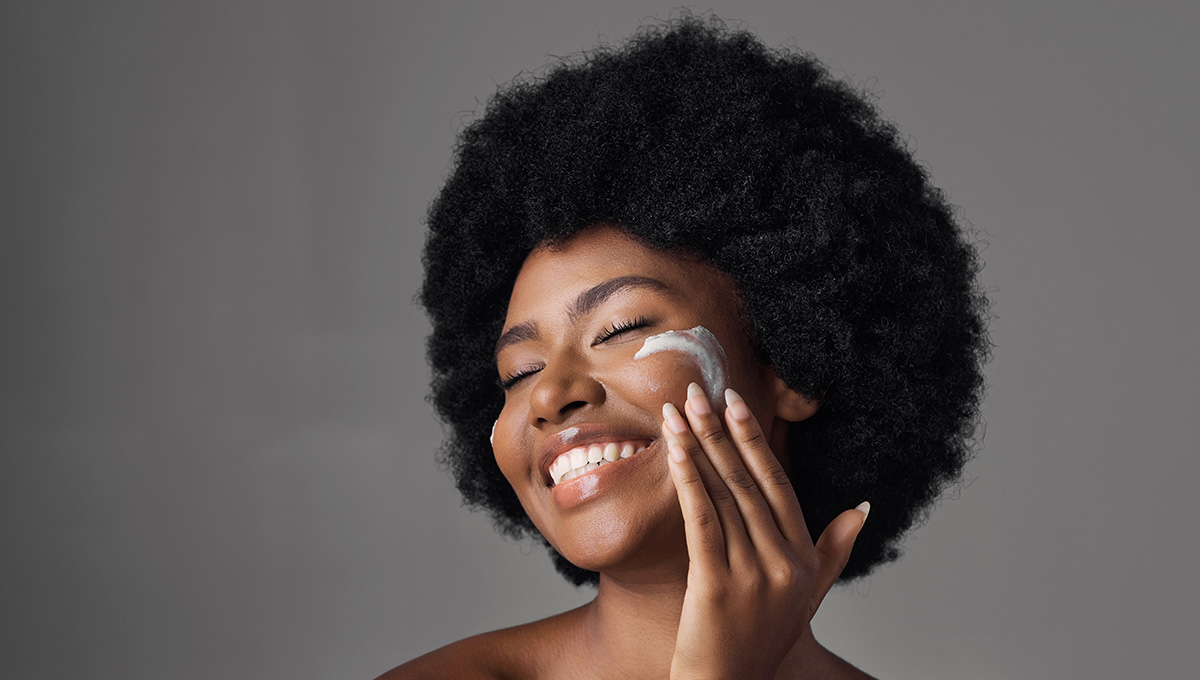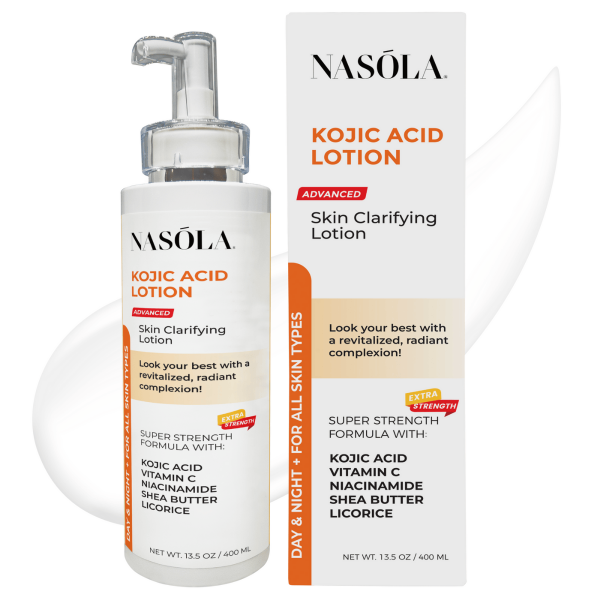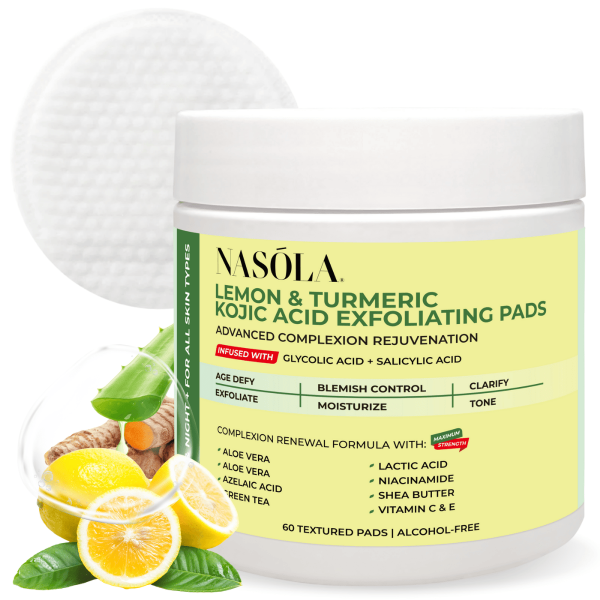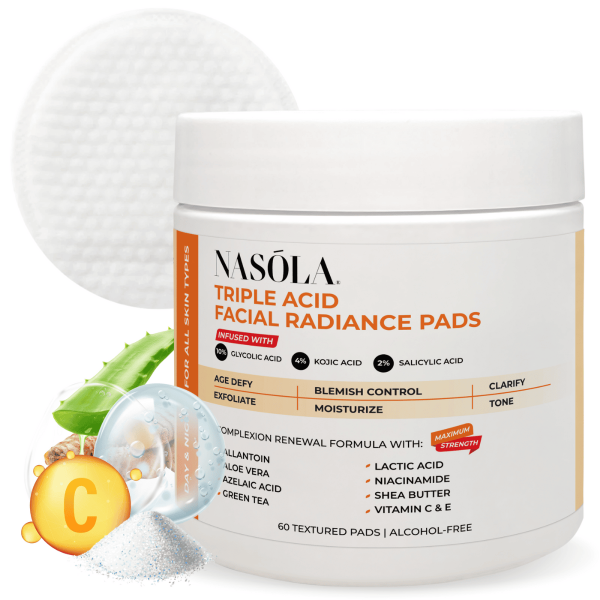Understanding what fades scars on Black skin is key to restoring confidence — and not just for aesthetic reasons.
Melanin, the natural pigment that gives skin its rich color, also plays a major role in how scars form, how long they last, and how discoloration lingers.
When injury or acne strikes, skin with higher melanin content often reacts with darker marks — sometimes for months.
Black skin is stunning, but it’s deeply misunderstood in mainstream skincare. That ends here.
In this guide, we’ll explore how melanin-rich skin scars differently, which ingredients are your skin’s true allies, and how products like the Nasola Kojic Acid Lotion, Nasola Kojic Acid Cream, Nasola Triple Acid Facial Radiance Pads, and Nasola Lemon Turmeric Kojic Acid Exfoliating Pads can confidently guide you toward clear, radiant skin.
- What Fades Scars on Black Skin: Understanding the Skin Science
- Kojic Acid: A Powerhouse Ingredient for Fading Scars on Black Skin
- Chemical Exfoliants That Effectively Treat Scars on Black Skin
- Natural Botanicals That Support Scar Fading on Melanin-Rich Skin
- Additional Strategies That Fade Scars on Black Skin
- Ingredient Spotlight: Kojic Acid’s Unique Role in Fading Scars on Black Skin
- What Fades Scars on Black Skin: Lifestyle Habits to Avoid
- Conclusion
- Frequently Asked Questions
What Fades Scars on Black Skin: Understanding the Skin Science
Hyperpigmentation hits different when your skin is melanated. The truth is? Scars last longer, and they appear darker — mostly thanks to how the skin produces melanin to protect itself.
But when healing goes into overdrive, discoloration can stick around longer than anyone wants.
Let’s explore why that happens in the first place… and what makes Black skin unique when it comes to healing.
Why melanin makes scar treatment different
Due to higher melanin content, Black skin experiences what’s known as post-inflammatory hyperpigmentation (PIH) more frequently. It’s the dark spot you might notice after a breakout clears up or after even a tiny scratch.
Here’s why melanin plays a big role:
- Inflammation or injury triggers the melanocytes to overproduce melanin
- The result? Dark spots or unevenened tone long after the injury fades
- PIH is not the scar itself, but a byproduct of melanin imbalance during healing
- Some scars form raised — even keloids — further complicating recovery
This is why pigmentation-focused ingredients and well-formulated topicals are essential for Black skin.
Types of scars common in Black skin
Certain kinds of scars show up more often in Black skin due to how melanin-rich dermis layers respond to trauma and inflammation.
- Hypertrophic scars: These are raised and thick, staying within the boundaries of the original wound.
- Keloids: Typically overgrow — extending beyond the wound’s site and becoming firm, shiny, and sometimes itchy.
- PIH (Post-Inflammatory Hyperpigmentation): Flat brown, black, or grey discolorations left behind after skin trauma.
- Stretch marks (striae): Not exclusive to Black skin, but often appear darker and take longer to fade.
Every scar has a story… but it shouldn’t stay with you forever.
Kojic Acid: A Powerhouse Ingredient for Fading Scars on Black Skin
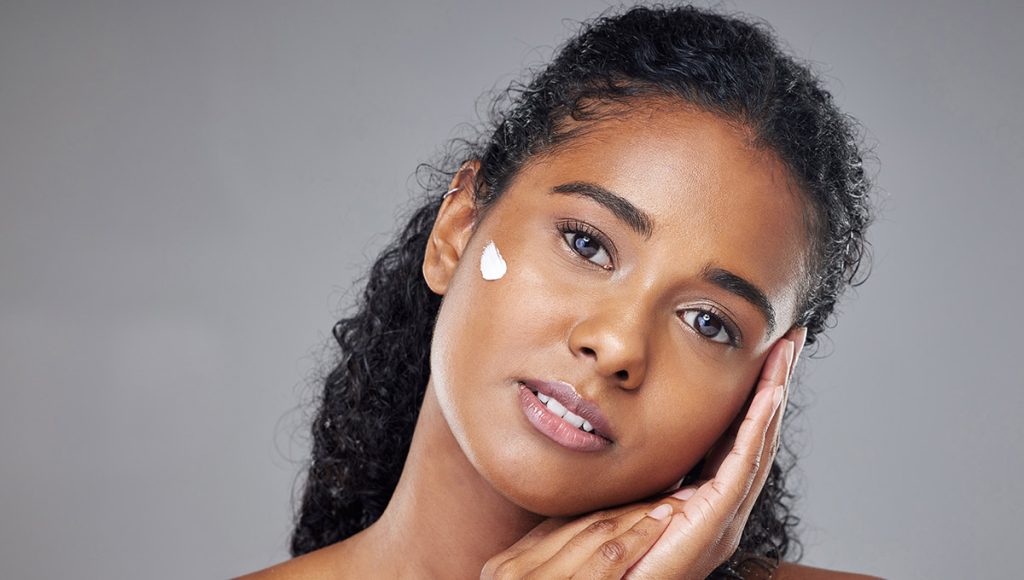
Kojic acid has become one of the most celebrated answers to the question: what fades scars on Black skin? It’s gentle, it’s effective, and when used consistently, results ARE visible.
Especially for those tired of hit-or-miss products — kojic acid provides targeted fading power without bleaching skin. Let’s look at how this ingredient shines for melanin-rich skin.
How kojic acid reduces dark spots and hyperpigmentation
Naturally derived from fungi through fermentation, kojic acid works dynamically with your skin’s chemistry.
Here’s why it’s so effective:
- Inhibits tyrosinase — the enzyme responsible for melanin production
- Fades sun spots, dark scars, and discoloration progressively with regular use
- Doesn’t lighten the surrounding skin — just evens out darker patches
- Gentle enough for daily or routine use
This makes it a great alternative to hydroquinone, especially if your skin is sensitive or reactive.
Best Kojic Acid Products for Black Skin Scars
Nasola Kojic Acid Lotion is your go-to for full-body scar fading. Whether it’s acne scars on the back or stretch marks on thighs, this lightweight lotion combines kojic acid with papaya extract and hydrating vitamin C. It’s non-sticky and absorbs beautifully.
Use daily after showering for brighter, smoother skin that glows from shoulders to ankles.
And for facial scars?
Nasola Kojic Acid Cream fits right into your AM/PM skincare like a tailored suit. Kojic acid joins forces with skin-loving moisturizers, helping you target dark spots without flaking or drying out. It layers seamlessly beneath makeup and does the heavy lifting while you sleep.
Chemical Exfoliants That Effectively Treat Scars on Black Skin
Chemical exfoliation isn’t just trendy skincare lingo. For Black skin? It’s a glow-up ritual.
These acids help clear clogged pores, slough away dull skin, and open pathways for brightening ingredients to enter. That’s critical when you’re looking at what fades scars on Black skin. Let me break down why exfoliation is more than just a “nice to have.”
How AHAs and BHAs improve skin texture and fade discoloration
Alpha Hydroxy Acids (AHAs) and Beta Hydroxy Acids (BHAs) serve different roles — both necessary for scar reduction.
- AHAs (like glycolic and lactic) exfoliate surface cells for a smoother texture
- BHAs (mostly salicylic acid) clean deep inside pores and reduce inflammation
- Exfoliation encourages faster cell turnover, helping dark spots fade quicker
- Regular exfoliation also softens pitted scars and improves product absorption
No more dullness. Just clarity.
Glycolic Acid and Salicylic Acid for exfoliation support
One product that does it all? Nasola Triple Acid Facial Radiance Pads.
These genius little pads are saturated with a skin-smoothing blend of glycolic acid, lactic acid, and salicylic acid. Use them after cleansing and before moisturizing to minimize acne marks, decongest pores, and brighten uneven tone.
They’re travel-friendly, fast-acting, and the results speak for themselves — skin that glows like you’ve finally figured it out (because you have).
Natural Botanicals That Support Scar Fading on Melanin-Rich Skin
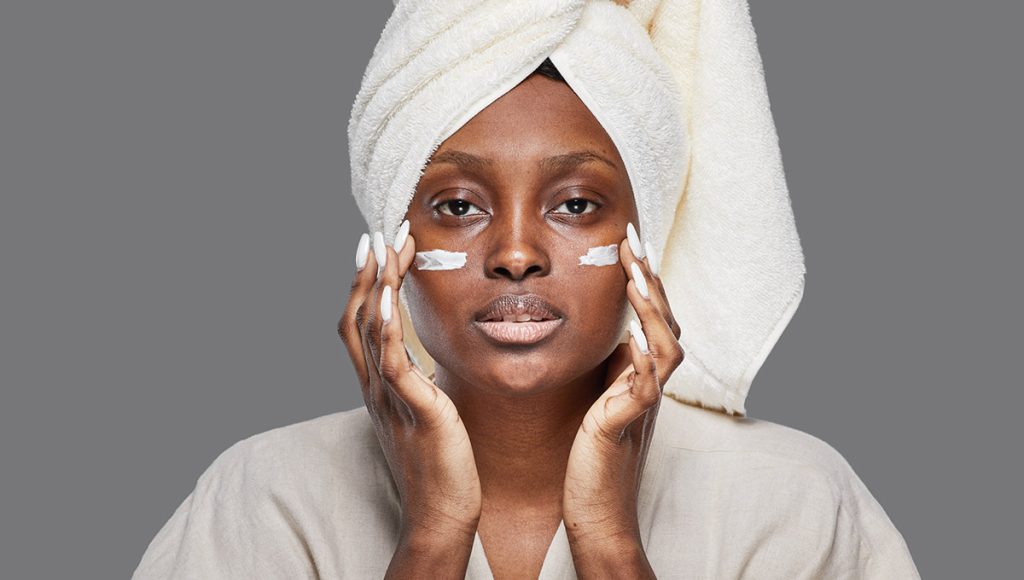
When people ask what fades scars on Black skin, they often hope for natural ingredients that work — ones without the sting, harsh chemicals, or complicated steps.
And wouldn’t you know it… nature gave us some beautiful answers.
Turmeric and Lemon Extract Benefits
Turmeric is more than a spice in your golden latte. It’s anti-inflammatory, antimicrobial, and antioxidant-rich. Basically, a triple threat against scars.
Lemon extract brings vitamin C into the mix — helpful for:
- Breaking down excess melanin
- Smoothing dull patches
- Encouraging collagen production
- Refreshing overall skin tone
The combo of turmeric and lemon is especially good for sensitive, blemish-prone Black skin that reacts to harsher treatments.
Recommended Product
Say hello to Nasola Lemon Turmeric Kojic Acid Exfoliating Pads — your new favorite ritual in a jar.
Each pad is infused with turmeric, lemon extract, and kojic acid. The formula gently buffs away dead skin and reduces spots week by week. No irritation… just improvement.
Use every 2–3 nights after cleansing and follow up with a good moisturizer. Great for cheeks, forehead, chin, and even body scars needing a loving reset.
Additional Strategies That Fade Scars on Black Skin
Even the best products need support. Here are two game-changing strategies that amp up your skincare results without any extra product.
Because what fades scars on Black skin isn’t only about what you apply — but how you support your skin’s environment daily.
Sun Protection Is Crucial
Scars exposed to the sun without SPF? They will darken.
- Use a broad-spectrum sunscreen (SPF 30 or higher)
- Reapply every 2 hours if outdoors
- Opt for sunscreens with zinc oxide or titanium dioxide
- Don’t skip sunscreen even when using scar-fading products
Remember, even indoor light contributes to hyperpigmentation — so slather that sunscreen, baby!
Hydration and Consistent Moisturizing
Dry skin doesn’t heal well. At all.
- Keep skin well-hydrated with hyaluronic acid-rich creams
- Use products that retain moisture like shea butter or glycerin
- Drink water (skincare starts on the inside too)
- Layer lighter hydration under thicker creams to lock it in
Moisturized skin = faster renewal = less visible scars in less time.
Ingredient Spotlight: Kojic Acid’s Unique Role in Fading Scars on Black Skin
We’ve said it (a few times), but let’s zoom in. Kojic acid is the queen when it comes to what fades scars on Black skin — and she deserves the spotlight.
From face to body, it offers melanin-balancing benefits that few other ingredients match.
What Makes Kojic Acid Effective
Kojic acid doesn’t just fade your dark spots; it prevents new ones.
- It slows melanin production at the source (hello, tyrosinase inhibition)
- Reduces appearance of sun damage, hormonal pigmentation, and acne scars
- Gentle enough for long-term use
- Often used in combination with natural extracts for max effectiveness
It’s versatile, reliable, and most importantly — it works.
Products Featuring Kojic Acid
- Nasola Kojic Acid Lotion: Daily body brightener for large fade zones (arms, back, legs).
- Nasola Kojic Acid Cream: Targeted facial scar fading with moisturizers built in.
- Nasola Lemon Turmeric Kojic Acid Exfoliating Pads: Mild yet powerful for evening tone and refreshing complexion.
For scars, hyperpigmentation, or any dark marks that overstay their welcome — kojic acid gives you power back.
What Fades Scars on Black Skin: Lifestyle Habits to Avoid
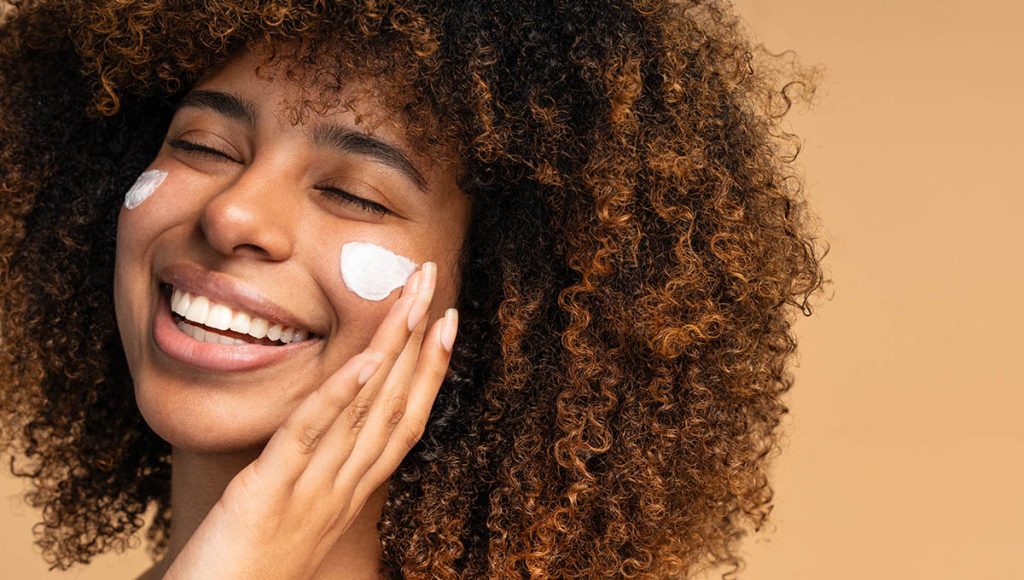
Let’s flip the script from doing more, to avoiding what slows your skin progress down.
Because sometimes… skincare is about subtraction more than addition.
Here’s what to steer clear of when trying to fade scars on melanated skin:
Picking or Scratching Active Spots
It’s tempting, especially when a pimple pops up before a big day.
But DON’T.
- Picking leads to inflammation = darker pigmentation
- More inflammation = more melanin activity = longer recovery
- Use gentle blemish control instead — like salicylic acid pads
- Let the skin breathe and heal, uninterrupted
Less trauma means less evidence left behind.
Using Harsh or Abrasive Scrubs
We’ve moved on from 2006 St. Ives apricot vibes, right?? 😅
- Physical scrubs with jagged particles can tear sensitive skin
- Can cause inflammation, especially on PIH-prone faces
- Switch to chemical exfoliants (like in Nasola’s pads)
- Smooth fade over harsh scratch = better results, zero irritation
Be kind to your face. No harsh tugging, no sanding down — just balanced renewal.
Conclusion
Fading scars on Black skin isn’t just tough — it’s personal. You’re not only working against time but against deeper systems in your skin that respond differently than what traditional skincare addresses.
The silver lining? You’ve now got knowledge and powerful tools.
With consistent use of kojic acid (especially in Nasola Kojic Acid Lotion, Nasola Kojic Acid Cream, and Nasola Lemon Turmeric Kojic Acid Exfoliating Pads), rotated with Nasola Triple Acid Facial Radiance Pads, your journey to clearer, more even skin is in motion.
Scars are not permanent. Neither is hyperpigmentation. You absolutely can heal and glow — with the right formula, support, and protection.
Start fresh. Stay consistent. Let clear skin tell your next story.
Frequently Asked Questions
A combination of kojic acid, glycolic acid, and consistent SPF use works most powerfully together. Applying kojic acid-based treatments like the Nasola Kojic Acid Cream daily can greatly accelerate the fading of dark spots on melanin-rich skin.
Yes. Kojic acid is well-tolerated by Black skin when used as directed. It doesn’t bleach skin but rather helps fade excess pigmentation. Try Nasola Kojic Acid Lotion for body treatment or Nasola Kojic Acid Cream for face.
Over-exfoliation can damage the skin barrier and increase dark spots. Use gentle exfoliators like the Nasola Lemon Turmeric Kojic Acid Exfoliating Pads which contain natural and effective acids safe for regular use.
Depending on severity and consistency, scars can fade in 4 to 12 weeks. Use products like the Nasola Triple Acid Facial Radiance Pads consistently for optimal results.
Glycolic acid, salicylic acid, and lactic acid all play strong roles. These are featured in Nasola Triple Acid Facial Radiance Pads to help resurface skin and clear acne marks.
Absolutely. Turmeric has long been used for skin healing and brightness. When combined with kojic acid and vitamin C as seen in Nasola Lemon Turmeric Kojic Acid Exfoliating Pads, it’s even more effective.
It doesn’t scar worse — it scars differently. High melanin activity causes lingering discoloration. Products targeting excess melanin, like Nasola Kojic Acid Cream, help reverse this process.
Yes. Nasola products are formulated for daily or routine use on Black skin — with ingredients that brighten without irritation.
Apply exfoliants and brightening creams at night for optimal absorption and reduced sun sensitivity. Don’t skip sunscreen the next day.
Definitely! After using exfoliating pads, seal in hydration with a light, non-comedogenic moisturizer. This helps reinforce your skin barrier and preserves your glow.

